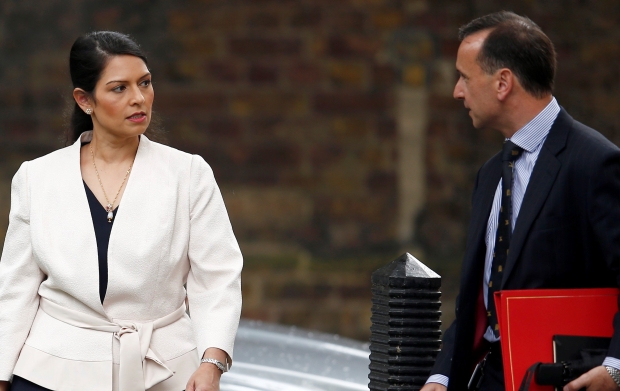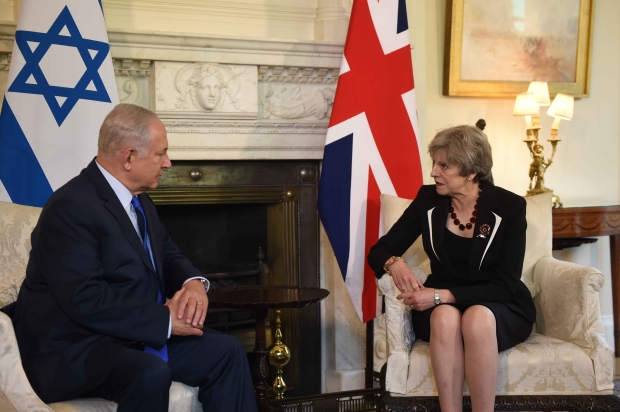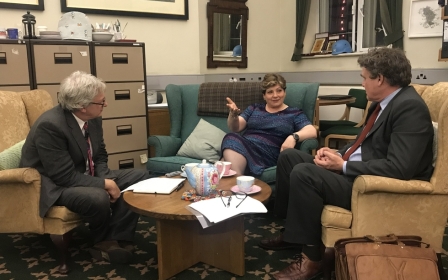Priti Patel and Israel: An appalling breach of UK diplomatic protocol

Israel has been caught out again trying to nobble the British political process. News that Priti Patel, the international development secretary, held undisclosed meetings in Israel without telling the Foreign Office falls into a well-established and troublesome pattern.
It brings back memories of the episode earlier this year when a mysterious "political officer" of the Israeli embassy called Shai Masot was caught on camera saying he wanted to "take down" Foreign Office minister Alan Duncan.
Of course all foreign embassies need to work quietly behind the scenes with the British government. But these new revelations from James Landale, the respected BBC diplomatic correspondent, show that Patel has gone far beyond acceptable conduct.
Far beyond acceptable conduct
Imagine the outcry had Patel arranged a series of private meetings with Russian businessmen and a senior Russian politician when on a private trip to Moscow without informing the Foreign Office. There would have been all hell to pay - and Patel would surely have been forced to resign.
It looks as if the international development secretary has broken the code of conduct which all ministers must respect.
This states that "ministers must ensure that no conflict arises, or could reasonably be perceived to arise, between their public duties and their private interests, financial or otherwise". Landale quotes a source from an ally of Patel at the Department for International Development who says that she was on a private holiday, paid for by herself.
That’s all well and good. But if she was on a private holiday, then she should not have combined it with meetings which were clearly relevant to her public role.
'Under the wing of pro-Israeli lobbyist'
The British currently spend approximately $85m a year on aid to the West Bank and Gaza, most of which comes from Patel's own departmental budget.
The international development secretary has long been known to oppose some of this spending on Palestine. Matters are made much worse by the fact that Patel was accompanied on part of her trip by Stuart Polak, a member of the House of Lords and one of the most powerful lobbyists in Westminster.
For the last 25 years, until his recent retirement, Polak has been a director of the Conservative Friends of Israel, an organisation which was once described by Conservative historian and Tory MP Robert Rhodes James in 1995 as "the largest organisation in Western Europe dedicated to the cause of the people of Israel".
Matters are made much worse by the fact that Patel was accompanied on part of her trip by Stuart Polak, one of the most powerful lobbyists in Westminster
No wonder Landale reports that there is outrage at the Foreign Office, quoting one former minister as asking: "What does it say to the rest of the Middle East if a senior cabinet minister in charge of Britain's huge aid budget disappears for 48 hours from a family holiday in Israel and is under the wing of a pro-Israeli lobbyist?"
Earlier this week, Defence Secretary Michael Fallon resigned following a report that he placed his hand on the knee of a female political correspondent more than 10 years ago.
Many people will believe that Patel's infraction is more important than that. In these circumstances it is nothing short of mind-boggling that Downing Street, according to Landale, is defending her escapade.
Imagine if it had been the West Bank
Just imagine if the situation was reversed. Just suppose that a British cabinet minister had travelled to the West Bank on a private holiday and then held a series of meetings with Palestinian businessmen and a leading Palestinian politician.
Just imagine the justified outrage from the Israeli government if this matter had come to public attention. There would have been a major international row, followed by an apology from the British government.
Yet Theresa May has shown herself to be habitually indifferent to Israel's interference in British politics. The Foreign Office showed no interest at all in investigating the evidence provided by the Qatari-owned TV channel Al Jazeera that Shai Masot had been interfering in British politics.
Israel is not simply allowed to go behind closed doors. It is permitted to cynically subvert the normal diplomatic protocol and procedures - and the May government cheerfully allows them to get away with it. According to the BBC, the Israeli ambassador in London helped arrange at least one of Priti Patel’s meetings, even though David Quarrey, the British ambassador in Tel Aviv, knew nothing about it.
Israel is not simply allowed to go behind closed doors. It is permitted to cynically subvert the normal diplomatic protocol and procedures
This reflects very badly on the British government, very badly on the Conservative party and, above all, raises worrying questions about Britain's relationship with Israel. How can Britain possibly play the role of honest broker in the Middle East if ministers are permitted to get away with this kind of behaviour?
How can the Palestinians possibly trust Britain? The answer is that they can't.
A commitment betrayed
This episode also explains a great deal that was discordant and wrong about last night's dinner between Israeli Prime Minister Benjamin Netanyahu and May to celebrate the 100th anniversary of the Balfour Declaration.
Of course it was right that this dinner should take place: the Balfour Declaration in 1917 was a momentous event because it helped give birth to a new nation within three decades.
But May should have been even-handed. She should have made certain that she met senior Palestinian politicians as well as Netanyahu. She made no attempt to do so.
This was a commitment that the British have clearly betrayed. This imbalance goes right through the British political system. During the past week, there have been a number of important events held by the Palestinians with the intention of telling their side of the story.
But May did not attend a single one of them. Nor did any of her ministers.
Why no investigation?
Here's one final thought about the Priti Patel affair. Last week, May ordered Jeremy Heywood, her cabinet secretary, to investigate alleged inappropriate behaviour by Mark Garnier, a junior minister, towards his former assistant.
This is a business which would normally have been sorted out by the Tory whip's office, in consultation with the Tory party chairman.
But the revelation that Patel has been in unauthorised and undisclosed communication with senior Israelis, without alerting the Foreign Office, is a far more serious government matter for a cabinet secretary.
We need to know exactly who Patel met. Landale reports allegations, without providing evidence, that she may have been seeking funding for a potential leadership bid.
Did Patel come under pressure to reduce British funding for Palestinian projects? What exactly did she discuss when she met Yair Lapid, chairman of the Yesh Atid party and a former Israeli finance minister? Why didn’t she inform the Foreign Office? Were officials from her own department informed? Did No 10 know? If so, did it approve the trip?
Why wasn’t she accompanied by civil servants? Why did the Israeli ambassador know about her trip when the Foreign Office didn’t? Who else did she meet on this unauthorised visit?
These are serious questions to which any British prime minister with any sense of integrity would want to know the answer. We need a Cabinet Office inquiry into Patel's trip to Israel, and the findings need to be made public.
If there has been impropriety, then Patel should be rebuked and, if necessary, apologise for her contemptuous breach of standard Whitehall procedure.
But May has shown no curiosity about any of this. This lack of action sends a clear message to all Palestinians: Britain cannot be trusted.
- Peter Oborne won best commentary/blogging in 2017 and was named freelancer of the year in 2016 at the Online Media Awards for articles he wrote for Middle East Eye. He also was British Press Awards Columnist of the Year 2013. He resigned as chief political columnist of the Daily Telegraph in 2015. His books include The Triumph of the Political Class, The Rise of Political Lying, and Why the West is Wrong about Nuclear Iran.
The views expressed in this article belong to the author and do not necessarily reflect the editorial policy of Middle East Eye.
Photo:Priti Patel, secretary of state for international development leaves Downing Street in June 2017 (Reuters/Stefan Wermuth)
Middle East Eye propose une couverture et une analyse indépendantes et incomparables du Moyen-Orient, de l’Afrique du Nord et d’autres régions du monde. Pour en savoir plus sur la reprise de ce contenu et les frais qui s’appliquent, veuillez remplir ce formulaire [en anglais]. Pour en savoir plus sur MEE, cliquez ici [en anglais].








